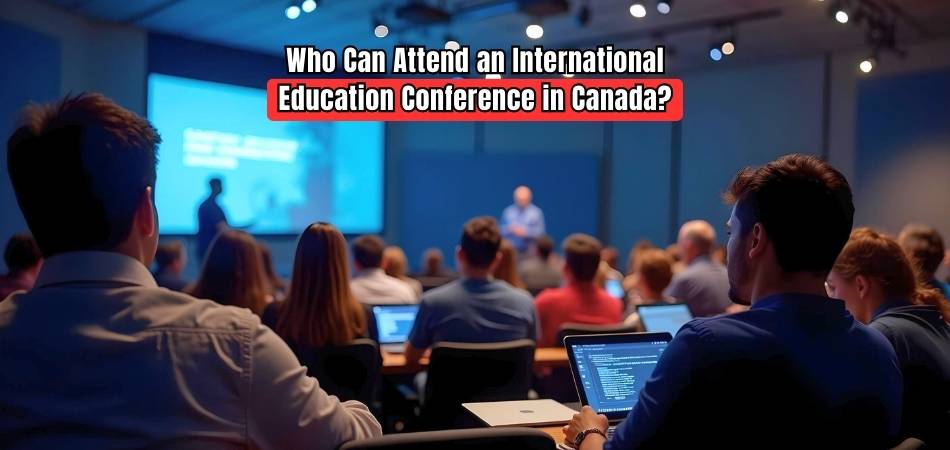International education conferences in Canada gather educators, administrators, researchers, and students from various backgrounds to discuss important trends and innovations in the field. These events support collaboration and the exchange of ideas among participants. You might be wondering, “Who can attend an international education conference in Canada?”
These conferences are open to a wide audience, including teachers, school leaders, policymakers, and education enthusiasts. Participants can range from emerging educators seeking insights to experienced professionals looking to network. Students studying education are also encouraged to attend, providing them with exposure to the professional world.
Are you curious to learn more about who can participate in these conferences? Keep reading this article to discover detailed insights and essential information that will help you understand the attendees and the value they bring to the event!
The Purpose of International Education Conferences
The purpose of international education conferences is to create a collaborative space where educators and stakeholders can come together to share knowledge, experiences, and best practices. These conferences address various topics relevant to education, such as curriculum development, teaching methods, educational technology, and policy changes.
Participants have the opportunity to attend workshops, panel discussions, and keynote presentations. These sessions often feature experts who share their insights on current trends and research in education. By learning from these experts, attendees can enrich their knowledge of effective practices and innovative strategies.
Networking is another essential component of these conferences. Participants can connect with other educators and stakeholders, developing relationships that can lead to future collaborations. These connections often result in ongoing discussions that extend beyond the conference, helping to build a supportive community of educators.
Who Can Attend an International Education Conference in Canada?
An international education conference in Canada aims to create an inclusive and collaborative environment for all participants. These conferences provide a platform for exchanging ideas, sharing experiences, and creating connections among individuals passionate about education. Knowing who can attend is essential for grasping the diverse perspectives that contribute to the richness of these events. The range of attendees typically includes:
Educators
Teachers and professors from various educational levels can attend these conferences. They benefit from workshops and presentations that introduce new teaching strategies and technologies. Networking with peers also allows them to share experiences and gain insights into their profession.
Administrators
School and university administrators, including principals and deans, play a crucial role in shaping educational policies and practices. They can gain valuable knowledge about trends in education and best practices for managing institutions. By attending, they can learn how to implement innovative approaches that promote the educational environment.
Researchers
Researchers in the field of education are essential attendees at these conferences. They present their findings, engage in discussions, and receive feedback on their work. This interaction can lead to collaborations that advance research and improve educational outcomes.
Policymakers
Policymakers at the local, regional, or national level also benefit from these conferences. They gain insights into current educational challenges and potential solutions that can inform policy decisions. Engaging with educators and researchers helps them understand the needs of the education sector.
Students
Students, especially those studying education or related fields, are encouraged to attend. Participating in these conferences allows them to connect with professionals and gain a broader perspective on their future careers. They can attend workshops and presentations that enrich their learning and career aspirations.
Other Stakeholders
Various other stakeholders, such as nonprofit organizations, businesses, and community leaders are welcome to participate. These groups often have a vested interest in education and can contribute to discussions on improving educational systems. Their involvement promotes partnerships that can lead to meaningful changes in the community.
An international education conference in Canada serves as a vital gathering for diverse participants interested in education. This includes educators, administrators, researchers, policymakers, students, and various other stakeholders, all contributing to enriching discussions. Engaging with different perspectives at the international education conference in Canada supports collaboration and innovation, ultimately enhancing the educational landscape.
The Benefits of Attending an International Education Conference in Canada
Attending an international education conference in Canada offers numerous benefits. These advantages can significantly enhance your professional growth and broaden your perspective of the education field. Here are some key benefits to consider.
Networking Opportunities
One of the most significant benefits is the chance to network with other professionals in the education sector. Conferences bring together a diverse group of attendees, including educators, researchers, and policymakers. Engaging with peers allows you to build meaningful connections that can lead to collaborations, mentorship, and future opportunities.
Learning from Experts
International education conferences feature presentations and workshops led by experts in the field. These sessions cover a wide range of topics, including new research, effective teaching strategies, and emerging technologies. Attendees can gain insights that can be applied to their own practices.
Exposure to Innovative Practices
Conferences showcase innovative practices and solutions in education. Attendees can learn about successful programs and initiatives implemented by other institutions. This exposure can inspire you to adopt new strategies in your own context. Seeing how others have tackled challenges can provide valuable ideas for your work.
Access to Resources
Many conferences feature vendors and organizations that offer resources for educators. You can access information about the latest educational tools, materials, and technologies. This access can help you stay informed about available resources that can upgrade your teaching. Connecting with vendors also allows you to ask questions and gain insights into their products.
Professional Development
Attending an international education conference contributes to your professional development. The knowledge and skills gained during the event can increase your effectiveness as an educator or administrator. Many conferences offer certificates of attendance or completion for workshops, which can be added to your professional portfolio.
From networking opportunities to learning from experts, these conferences enrich your professional journey, showcasing the benefits of attending education conferences in Canada. Engaging with innovative practices and accessing valuable resources further upgrade your experience. By participating in these events, you invest in your development and the future of education.
Are There Age Restrictions for Attendees?
International education conferences are generally open to individuals of all ages. However, some conferences may have specific age-related considerations. Understanding these can help you determine if the event is appropriate for your needs. Here are some key points regarding age restrictions for attendees:
General Age Inclusivity
Most international education conferences welcome attendees from diverse age groups. This inclusivity allows for a rich exchange of ideas and perspectives. Younger educators, students, and seasoned professionals can all contribute to discussions and benefit from shared experiences.
Student Participation
Students are often encouraged to attend conferences, especially those studying education or related fields. Many conferences offer discounted rates for students, making participation more accessible. Engaging in these events can help students build connections and gain insights into their future careers.
Youth Programs
Some conferences may have youth programs or sessions designed specifically for younger attendees. These programs aim to provide valuable experiences and support the development of emerging leaders in education. Participants in these programs may engage in customized activities that better their understanding of the field.
Special Considerations
While most conferences do not have strict age restrictions, it’s essential to review the specific guidelines for each event. Some conferences may have workshops or sessions that are better suited for particular age groups or professional stages. Always check the event details to ensure it aligns with your expectations and needs.
What Qualifications Are Needed to Attend?
Qualifications for attending international education conferences can vary based on the event’s focus and goals. Generally, there are no strict qualifications required for most attendees. However, here are some considerations to keep in mind:
Educational Background
While many conferences welcome attendees from various backgrounds, having a background in education can ensure a better experience. Educators, administrators, and researchers often find the content more relevant to their work. However, those with a strong interest in education are also encouraged to participate.
Professional Experience
Professional experience in the education sector can be beneficial but is not mandatory. Individuals who work in schools, universities, or educational organizations will find many sessions directly applicable to their roles. Networking with others in similar positions can also provide valuable insights into best practices.
Students
Students studying education or related fields are encouraged to attend. Many conferences offer discounted rates for students, allowing them to gain valuable exposure to the field. Participation can provide insights into career paths and future opportunities in education.
Specific Requirements
Certain specialized conferences may have specific requirements or qualifications. For example, conferences focused on particular teaching methodologies or technologies may benefit those with experience in those areas. Always review the details for each conference to understand any specific qualifications that may be applicable.
How to Prepare for an International Education Conference?
Preparing for an international education conference can enrich your experience and ensure you make the most of the event. To maximize your participation, be sure to register for an international education conference early and follow these steps to get ready for a successful conference.
Research the Conference Agenda
Begin by researching the conference agenda thoroughly. Familiarize yourself with the schedule, including keynote speakers, workshops, and panel discussions. Identifying sessions that interest you will help you plan your time effectively. Mark your calendar with the sessions you want to attend to ensure you don’t miss out.
Set Clear Goals
Establish clear goals for what you hope to achieve during the conference. Consider whether you want to network, learn specific skills, or showcase your work. Writing down your objectives will help you stay focused throughout the event. Reflecting on your goals can also guide your engagement with other attendees.
Prepare Your Materials
If you plan to present or showcase your work, prepare your materials well in advance. This may include portfolios, business cards, or promotional items that highlight your achievements. Ensure everything is organized and ready to share with others, as this preparation will leave a positive impression.
Pack Essentials
Make a checklist of essentials to pack for the conference. Consider comfortable clothing, professional attire for presentations, and any materials you may need. Don’t forget items like a notebook for taking notes, a laptop or tablet, and chargers for your devices. Staying organized will contribute to a smooth experience.
Plan Your Travel
Make travel arrangements ahead of time to secure the best rates. Look for deals on flights and accommodations, and consider transportation options to the venue. Arriving a day early can help you settle in and reduce stress before the conference begins. Confirm your travel details to avoid last-minute complications.
Engage With Other Attendees
During the conference, actively engage with other attendees. Introduce yourself, ask questions, and share your experiences. Networking is a valuable aspect of the conference experience, so make an effort to connect with others. The relationships you build can lead to future opportunities and collaborations.
Frequently Asked Questions
Attending an international education conference in Canada may raise questions. To help you get the right answer, we’ve compiled some common questions related to the conference. Find your answers below to ensure a smooth and successful conference experience:
Who Can Attend an International Education Conference?
International education conferences are open to a wide range of participants. Educators, administrators, researchers, students, and anyone interested in education can attend. These events develop collaboration and learning among diverse stakeholders. The inclusive nature improves the experience for all attendees.
What Are the Benefits of Attending an International Education Conference?
Attending an international education conference offers numerous benefits, including networking opportunities, professional development, and exposure to innovative practices. Participants can learn from industry experts and connect with peers. The knowledge gained can significantly speed up their careers and educational approaches. Overall, these conferences provide a valuable experience for attendees.
Are There Age Restrictions for Attendees?
Generally, international education conferences do not impose strict age restrictions. They welcome individuals of all ages, from students to seasoned professionals. Some conferences may have specific youth programs designed for younger attendees. Always check the event details for any specific guidelines that may apply.
How Should I Prepare for an International Education Conference?
Preparing for a conference involves researching the agenda, setting clear goals, and organizing materials. Familiarize yourself with key sessions and speakers you want to engage with. Packing essentials and planning your travel arrangements in advance will contribute to a smoother experience. Staying organized is key to maximizing your time at the event.
Can Students Attend International Education Conferences?
Yes, students are encouraged to attend international education conferences, especially those studying education or related fields. Many conferences offer discounted rates for students, making participation more accessible. Attending these events allows students to connect with professionals and gain insights into their future careers. It’s a valuable opportunity for their professional growth.
Final Thought
Attending an international education conference can greatly increase your knowledge of the education industry. These events provide a unique opportunity for networking, learning, and professional development. Engaging with peers and experts can lead to new ideas and collaborations that enrich your practice.
So, who can attend an international education conference in Canada? The answer is simple: a diverse range of participants is welcome, including educators, administrators, researchers, students, and anyone interested in the field of education. This inclusivity ensures a rich environment for sharing experiences and knowledge among attendees.








